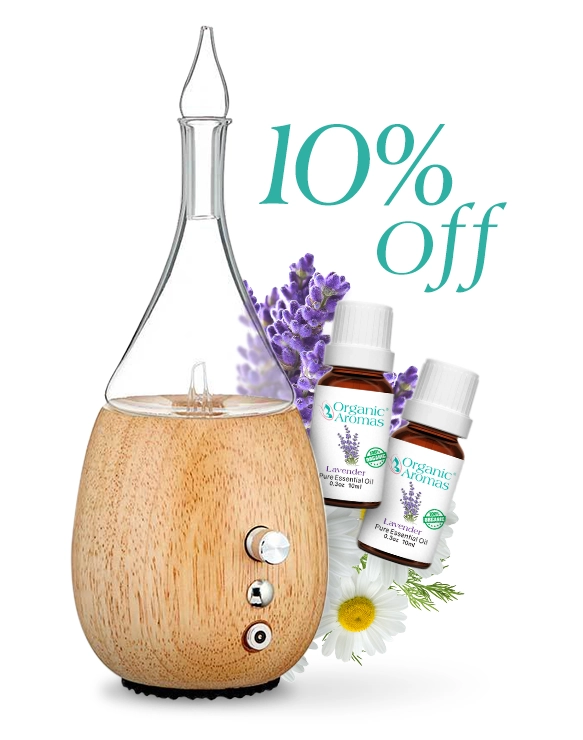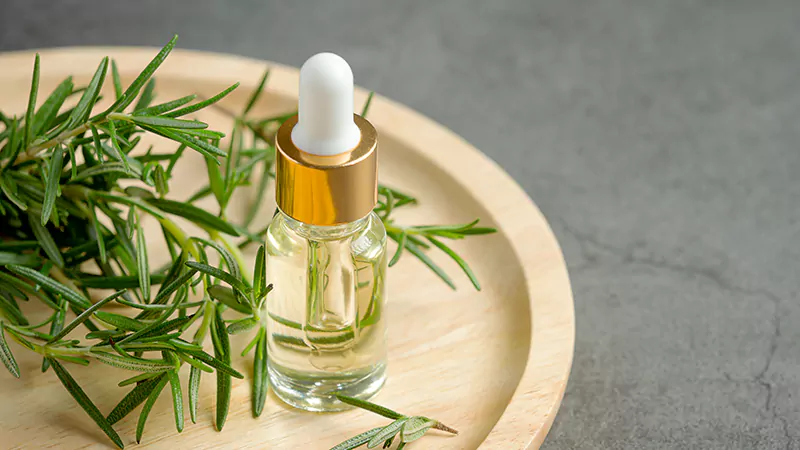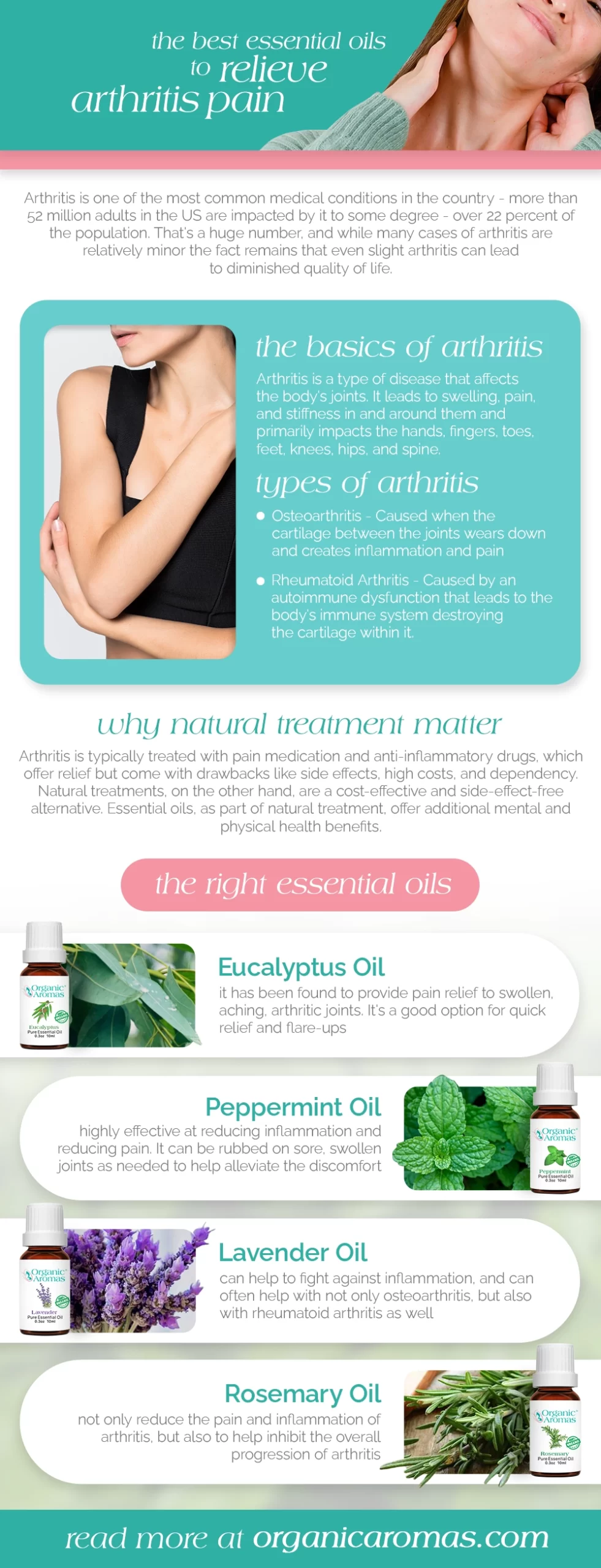The Best Essential Oils to Relieve Arthritis Pain
Like it or not, we can’t stop time. And as we age, our body will face various challenges large and small. Arthritis is one of the most common medical conditions in the country – more than 50 million adults in the US are impacted by it to some degree – over 22 percent of the population. That’s a huge number, and while many cases of arthritis are relatively minor the fact remains that even slight arthritis can lead to diminished quality of life.
That’s why understanding the best way to control and manage arthritis is so important. And luckily, there are plenty of options out there for doing so – including using essential oils to naturally manage the symptoms.
Understanding Arthritis: Causes, Symptoms, Types, and Complications

Arthritis is a common yet misunderstood disease. Contrary to popular belief, arthritis isn’t a single condition; it’s an informal way of referring to joint pain or joint disease, encompassing over 100 different types of conditions. According to the Arthritis Foundation, more than 53 million adults and 300,000 children in the U.S. have some type of arthritis.
What is Arthritis?
Arthritis is a broad term that covers a group of over 100 diseases. It involves inflammation or swelling in and around the body’s joints, such as the knees, wrists, or fingers. While arthritis-related conditions primarily affect joints, they can also impact muscles, connective tissues, and organs.
Causes of Arthritis
The causes of arthritis depend on the form of arthritis. Possible causes may include:
Injury (leading to osteoarthritis): An injury may cause osteoarthritis, even years after the initial trauma.
Metabolic abnormalities (such as gout and pseudogout): These conditions result from materials being deposited into the joints.
Hereditary factors: Certain types of arthritis run in families.
Infections: Many microbial agents can infect joints and potentially cause arthritis.
Immune system dysfunction (Rheumatoid arthritis and systemic lupus erythematosus): In these conditions, the immunity attacks the body’s own tissues, causing inflammation and joint damage.
Symptoms of Arthritis
Arthritis symptoms can vary depending on the type of arthritis. Common symptoms include:
Joint pain
Stiffness, especially in the morning or after sitting for long periods
Swelling of the joints
Redness and warmth around the joint area
Decreased range of motion

Give Me a 10% Discount!
Types of Arthritis
There are more than 100 different types of arthritis and related conditions. The most common types include:
Osteoarthritis (OA): This is the most common type of arthritis, affecting millions of people worldwide. It occurs when the protective cartilage that cushions the ends of your bones wears down over time.
Rheumatoid Arthritis (RA): An autoimmune disorder where the body’s immune system attacks its own tissues, including joints. In severe cases, it can attack internal organs and lead to serious complications.
Psoriatic Arthritis: A form of arthritis that affects some people who have psoriasis — a condition that features red patches of skin topped with silvery scales.
Gout: A painful form of arthritis that occurs when high levels of uric acid in the blood cause crystals to form and deposit around a joint.
Complications of Arthritis
If left untreated, arthritis can lead to several complications, including:
Chronic pain: Arthritis can cause persistent pain that affects daily activities and quality of life.
Physical deformities: Certain types of arthritis can cause changes in the appearance and function of the joints.
Reduced range of motion: Inflammation in the joints can limit movement and flexibility.
Heart complications: Some types of arthritis can increase the risk of heart disease.
Arthritis is a complex group of conditions with diverse causes and types. If you suspect you might have arthritis, it’s important to seek medical advice. Early diagnosis and appropriate management are crucial to help manage symptoms and prevent disease progression.
Natural Ways to Help Arthritis
Arthritis treatment is often handled with pain medication and anti-inflammatory drugs. But while these options can indeed provide some measure of relief, they’re not without drawbacks. These medications can lead to side effects, heavy treatment costs, dependency, and more. Because of this, switching to natural treatment is something that makes a lot of sense for arthritis patients. Consider following:
- Using natural treatments means avoiding most side effects
- They’re often much cheaper and easier to fit into a budget
- Essential oils as a treatment also provide additional mental and physical health benefits
In short, trying out natural remedies is something that any arthritis sufferer should consider doing and something that can provide very real relief to you.

The Best Essential Oil to Relieve Arthritis Pain
Of all the various natural remedies, essential oils are among the most effective. They can offer significant pain reduction, reduced stiffness, and more – all without the side effects of synthetic medication. But not all essential oils are as effective for arthritis as others.
A good number of essential oils have pain relieving properties. Knowing how to treat arthritic pain and joint inflammation are key to treat arthritis effectively. Here are the best essential oils for arthritis.
- Eucalyptus Oil – This essential oil comes from the eucalyptus plant that is native to Australia. Used in that country for centuries by the Aboriginal tribes for its numerous healing properties, eucalyptus essential oil has been found to provide pain relief to swollen, aching, arthritic joints. It’s a good option for quick relief and flare-ups thanks to its anti inflammatory properties.
- Peppermint Oil – More than just a popular flavoring in gum and candy, peppermint is also highly effective at reducing inflammation and reducing pain. It can be rubbed on sore, swollen joints as needed to help alleviate the discomfort and add some measure of relief.
- Lavender Oil – With a sweet, mild scent that is known for helping the mind relax and de-stress, lavender essential oil has always been one of the first essential oils added to a home. But it can also help to fight against inflammation, and can often help with not only osteoarthritis, but also with rheumatoid arthritis as well.
- Rosemary Oil – The same plant used in so many recipes is also effective at healing. Rosemary essential oil has been shown to not only reduce the pain and inflammation of arthritis, but also to help inhibit the overall progression of arthritis in studies conducted on lab rats. It may help prevent the breakdown of cartilage and thus prevent the severity of the disease. Others like ginger oil, orange oil and turmeric essential oil are also effective for this condition. They have great anti inflammatory effects.

Top Benefits of Using Essential Oils to Remedy Arthritis
Pain Relief: Essential oils like ginger essential oil contain chemicals with analgesic effects that can help alleviate arthritis pain. Similarly, a massage with lavender essential oil has been found to ease musculoskeletal and knee pain from osteoarthritis.
Anti-Inflammatory Properties: Many essential oils, including frankincense and eucalyptus, possess anti-inflammatory properties that may help reduce swelling and inflammation associated with arthritis.
Improved Mobility: Essential oils may help improve mobility by reducing pain and inflammation. This can make it easier for individuals with arthritis to move around and perform daily activities.
Relaxation and Stress Relief: The aromatherapy benefits of essential oils can provide stress relief and promote relaxation, which is beneficial for overall wellness and can potentially help manage chronic conditions like arthritis.
Versatility: There are a variety of essential oils recommended for arthritis, including eucalyptus, ginger, turmeric, frankincense, and orange. This provides individuals with multiple options to find what works best for them.

Sign Up to Get Your e-Book Here
How to Use Essential Oils
In order to properly use the essential oils listed above, it’s important to remember that applying them directly to the skin can be quite irritating. Instead, it’s best to mix the oils with a carrier oil such as coconut oil or almond oil. Other good carrier oils are jojoba oil, avocado oil, evening primrose oil and more. Skin irritation is averted when a diluted oil is used for joint pain.
This helps dilute the oils so they aren’t irritating while still providing a high level of relief. Use a dilution of about 3-5ml of essential oils to every 100ml of carrier oil. Some of the oils may be effective and non-irritating without dilution, like lavender oil, but dilution is always the safer option. A few drops go a long way.
Experiment with different oils for joint pain and even consider blending two or more of the above options together with the carrier oil until you find the solution that provides the best level of relief. The evidence continues to show that essential oils could help with arthritis pain, and with a bit of time you’ll be able to find the best ones for your own situation.
Final Take
Essential oils can be a beneficial supplement to traditional treatments for joint pain and arthritis. When used safely and correctly, they can provide relief from pain and inflammation, improve mood, and promote overall well-being. They offer a natural alternative that can complement conventional medical treatments.
However, it’s crucial to remember that essential oils are not a cure-all. It’s important to consult with a healthcare provider before starting any new treatment regimen, especially for those with chronic conditions like arthritis.
Furthermore, not all essential oils are created equal. Quality can vary greatly, so it’s essential to choose pure, therapeutic-grade oils from reputable sources. Finally, always use essential oils as directed, either topically or through a diffuser, and never ingest them unless under the guidance of a health professional. All in all, with proper usage and precautions, essential oils can be a valuable tool in managing joint pain and arthritis.



avrebo
I noticed a huge difference with my arthritis when I used Superior hemp oil. Every few hours I put a few drops under my tongue and it’s night and day! I’m actually able to make coffee in the mornings now, and can even make a fist! The taste isn’t too bad either. I highly recommend this if you’re dealing with any inflammation issues.
ive got osteoporosis and osteoarthritis which are really bad in the bottem half of my back theres no spaces left in the bottem of my spine and very painful i will try your oils
thanks for the information
I’m eager to order my 1st set.its hard to decide where to start… I have lots of areas where I have been struggling and they are not helped by medicines so I am.open to try E.O’s… Thanks for everyones tips and reviews…
I’m so lucky to have both kinds of arthritis: RA and osteo. Thanks for the info on oils for this.
amazing amazing job
Very informative!
Thank you.
Quite interesting read! I gotta try those for my lolo.
I love this blog and will share the info with my family members who suffer from arthritis. Thanks!
Love how much I learn on these blogs. Thank you.
Beautiful products!
Thank you so much for this article. I do a ton of typing for my job which is resulting in arthitis of my fingers. I will definitely give this a try once I have all of the essential oils. (pinned it).
Love all 4 of those essential oils for arthritis. Good for muscle pain also.
Thank you for this blog post. So helpful. I love that you also give recommendation on dilutions.
Quite informative, thanks
Great information! Thank you.
Thank you for always giving such helpful tips on everything that you do. My Dad has arthritis in his shoulder and I can’t wait to tell him about this!!
Hands down the best Aromas and Diffusers! No water. Amazing smell
Nebulizer are the way to Go!! No heat, no water to waste your precious essential oils by diluting them. Just a pure fine mist permeating your room, calming your senses…. Or rejuvenating You!… Whichever you choose. Timed perfectly, you never have to be concerned, these beautifully crafted diffusers will make your day… And night!! I love mine!!!
I love not having to use water. Feels like the oils work better. Easy to clean too! 🙂
I have degenerative disc disease, 2 herniated discs in my neck, and osteoporosis. This is such Great information regarding arthritis. I’ll definitely try these natural remedies. Thank you for sharing this information! I look forward each week to read your blog posts and would love to win one of these Nebulizing Diffusers. This would be so much better to use for diffusing essential oils because it doesn’t require water and diffuses just essential oils for better aromatherapy benefits. Thank you for the weekly giveaway!
I love my diffuser & all of its benefits
I’m learning more and more about essential oils and how to use them to enhance my overall health and wellness however I do not see “hot oil” warnings often and as peppermint as a hot oil a note to parents should be included regarding safe usage practices around kids!
Very interesting, especially about Rosemary’s possibility of preventing further breakdown of cartilage. Thank you for sharing.
Thanks for the valuable information
Never knew there were so many essential oils and uses!! I would love to try this!!
I didn’t know peppermint oil would help this. Thanks for the great info.
Thank you for this post! I use a Rosemary Oil a lot
Very helpful blog. Thank you. Xx
Frankincense , Spearmint, and Ylang ylang are fantastic for pain. Thanks so much for the chance to win in your Nebulizing Diffuser Giveaway!
I agree with this whole statement. Essential oils have changed my life for sure
Thank you for sharing which oils will help my arthritis.